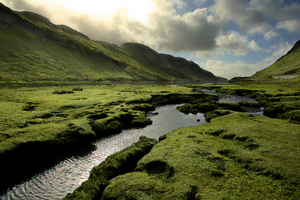I remember as a child my father would often sing songs in the house or while my brothers and sisters and I were riding in the car with him. He had a remarkable baritone voice and when he was a young man he sang in the chorus, at times, in the Metropolitan Opera in New York City. He sang many different songs during our childhood, but there is one, in particular, that has always been dear to my heart: “The Bonnie Banks of Loch Lomond.” As time has gone by I have carried on my father’s tradition and I sing songs to myself and my family and to anyone who will listen from time to time, including “The Bonnie Banks of Loch Lomond.”
I have always loved this somewhat melancholy tune and though, I thought, the story is very sad, it’s still a beautiful song. Little did I know how sad the story behind the music was. Until recently I thought it was about two young lovers that had a falling out. I never really understood what was meant by the high road and the low road and why they would never meet again. And I’m half Scots on my mother’s side. A Malcolm.
Below is a particularly beautiful rendition of this haunting Scottish song
https://www.youtube.com/embed/gb8AGuD2uOI?autoplay=0&mute=0&controls=1&origin=https%3A%2F%2Fwww.jongleman.com&playsinline=1&showinfo=0&rel=0&iv_load_policy=3&modestbranding=1&enablejsapi=1&widgetid=1
A few days ago my morning song, (I always wake up with a morning song), was “The Bonnie Banks of Loch Lomond.” I keep an ongoing list of my morning songs now, and in the process of finding this particularly beautiful version by Ella Roberts above, I thought I would look up who wrote the song and maybe a little bit of its history. I was not prepared for what I found.
“The Bonnie Banks of Loch Lomond”
The words were written by Andrew Lang around 1876
Historical Background – from Frank Ticheli – Manhattan Beach Music
The song is based on the traditional belief that your soul will return to your home before you go to heaven, so beautiful.
At the time in Scottish history when “Loch Lomond” was a new song, the United Kingdom (which united Scotland, England, and Wales) had already been formed. But the Highland Scots wanted a Scottish, not an English King to rule. Led by their Bonnie Prince Charlie (Prince Charles Edward Stuart) they attempted unsuccessfully to depose Britain’s, King George II. An army of 7,000 Highlanders was defeated on April 16, 1746, at the famous Battle of Culloden Moor.
It is this same battle that indirectly gives rise to this beautiful song. After the battle, many Scottish soldiers were imprisoned within England’s Carlisle Castle, near the border of Scotland. “Loch Lomond,” tells the story of two Scottish soldiers who were so imprisoned. One of them was to be executed, while the other was to be set free. According to Celtic legend, if someone dies in a foreign land, his spirit will travel to his homeland by “the low road” – the route for the souls of the dead. In the song, the spirit of the dead soldier shall arrive first, while the living soldier will take the “high road” over the mountains, to arrive afterward.
The song is from the point of view of the soldier who will be executed: When he sings, “ye’ll tak’ the high road and I’ll tak’ the low road” in effect he is saying that you will return alive, and I will return in spirit. He remembers his happy past, “By yon bonnie banks … where me and my true love were ever wont to gae [accustomed to go]” and sadly accepts his death “the broken heart it ken nae [knows no] second Spring again.”

The song takes on a whole new meaning for me now. Of course, it still has a beautiful and engaging melody. But knowing the story and the history behind the words now makes it, to me, even sadder.
I wonder, throughout mankind’s history, how many poems have been written, how many songs have been sung about the fallout of war? Our written history, since the very beginning, has been filled with the horrors that we have inflicted on ourselves through our wars. How many times has someone taken the low road to never meet their true love again? How do we make it stop? Something very much worth putting some thought into and striving for, I think. Not just living in peace and harmony with one another but with all our fellow “earth-born companions” and our magnificent planet Mother Earth.
